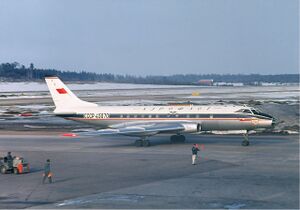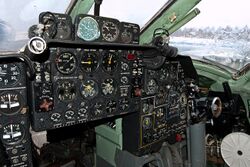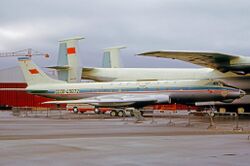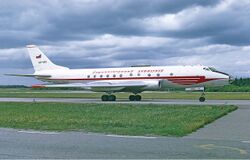Engineering:Tupolev Tu-124
| Tupolev Tu-124 | |
|---|---|
 Aeroflot Tu-124 at Arlanda Airport C. 1966 | |
| General information | |
| Designer | Tupolev |
| Built by | Kharkiv State Aircraft Manufacturing Company |
| Management and usage | Aeroflot ČSA, Interflug, Iraqi Airways |
| Number built | 164 |
| History | |
| Manufactured | 1960–1965 |
| Introduction date | 2 October 1962 |
| First flight | 29 March 1960 |
| Retired | 1980 Aeroflot, 1990 Iraqi Airways, 1992 (military service) |
| Developed from | Tupolev Tu-104 |
| Developed into | Tupolev Tu-134 |
The Tupolev Tu-124 (NATO reporting name: Cookpot) is a 56-passenger short-range twin-jet airliner built in the Soviet Union. It was the Soviet Union's first operational airliner powered by turbofan engines.[1]
Design and development

Developed from the medium-range Tupolev Tu-104 jetliner, the Tu-124 was meant to meet Aeroflot's requirement for a regional airliner/jetliner to replace the Ilyushin Il-14 on domestic routes. Resembling a 75% scaled-down Tu-104, the two were hard to tell apart at a distance but it was not a complete copy of the Tu-104. The Tu-124 had a number of refinements, including double-slotted flaps, a large center-section airbrake and automatic spoilers. Unlike the Tu-104, the wing trailing edge inboard of the undercarriage was unswept.[2]
The standard seating of the basic version was 44 seats. The first of two prototype, SSSR-45000 (C/N 0350101) made its first flight from Zhukovsky airfield on 24 March 1960. The second prototype, SSSR-45001 (C/N 0350102), followed in June 1960. Two other airframes served as a static test cells. Testing was successful, and the aircraft entered production at Factory 135 at Kharkiv, Ukraine, replacing the Tu-104 in production.[3][4] Deliveries to Aeroflot began in August 1962, with the type operating its first scheduled passenger service, between Moscow and Tallinn in Estonia, on 2 October 1962.[5]
Operational history
Aeroflot was impressed with the flight performance of the Tu-124 and used it on domestic routes from the end of 1962.

A number were also sold to military users, including the Soviet Air Force, which used them as navigational trainers, and to the Chinese Air Force.[3][6]
Several Tu-124s have been preserved. One is in the museum of the Kharkiv State Aircraft Manufacturing Company (formerly the Tu-124 manufacturer Factory 135), another is in the China Aviation Museum in Beijing, another at the Central Air Force Museum at Monino outside Moscow. A Tu-124K is on display at New Delhi Airport and next to the State Museum at Lucknow Zoo.[7]
Variants
- Tu-124/Tu-124V
- The first production variant. International demand was small, as most foreign airlines were waiting to buy the improved Tupolev Tu-134
- Tu-124B
- Three prototypes with D-20P-125 engines, built in 1963
- Tu-124K/Tu-124K2
- VIP configuration operated by the militaries of Iraq and China, and by the Indian Air Force
- Tu-124Sh-1
- Military version used as navigator trainer
- Tu-124Sh-2
- Military version used as navigator trainer
- Tu-127
- Proposed military transport version, not built.
- Tu-124A
- Despite bearing this designation, this aircraft (CCCP-45075) was the prototype Tu-134, with engines located at the rear, and totally revised wings and T-tail. Preserved at Moscow-Novogireyevo.
Former operators
Former civil operators

 Czechoslovakia
Czechoslovakia
- ČSA Three Tu-124V (OK-TEA, -TEB, -UEC)[8]
 East Germany
East Germany
- Interflug Three (DM-SDA, -SDB, plus ?) (Interflug colours but operated on behalf of the East German Air Force)[9][10]
 Iraq
Iraq
- Iraqi Airways Two Tu-124V (YI-AEL, -AEY)[11]
 Soviet Union
Soviet Union
- Aeroflot
Former military operators

 China
China
- People's Liberation Army Air Force
 Czechoslovakia
Czechoslovakia
- Czechoslovak Air Force
 East Germany
East Germany
- East German Air Force
 India
India
- Indian Air Force (three Tu-124K VIP variants)
 Iraq
Iraq
- Iraqi Air Force
 Soviet Union
Soviet Union
- Soviet Air Force
Accidents and incidents
A total of fifteen Tu-124s were written off in crashes during the type's operational career; another two aircraft of Iraqi Airways were destroyed on the ground during the Gulf War.[12]
1960s
- 21 August 1963
- Aeroflot Flight 366, a Tu-124 (CCCP-45021), ditched in the Neva River in Leningrad (now Saint Petersburg) after both engines failed due to fuel exhaustion while the crew was preoccupied with landing gear problems; all 52 on board survived.[13]
- 8 March 1965
- Aeroflot Flight 513, a Tu-124 (CCCP-45028), stalled and crashed shortly after takeoff from Kuybyshev Airport, killing 30 of 39 on board.[14]
- 11 November 1965
- Aeroflot Flight 99, a Tu-124V (CCCP-45086), crashed on the frozen Lake Kilpyavr after the pilot mistook lights near Murmansk Airport for the runway threshold lights, killing 32 of 64 on board.[15]
- 13 June 1966
- An Aeroflot Tu-124 (CCCP-45017) overran a wet runway on landing at Minsk-1 International Airport and was written off; no casualties.[16]
- 27 July 1966
- Aeroflot Flight 67, a Tu-124V (CCCP-45038), went into a dive over Zaporizhzhia Oblast after flying into a storm at 7,200 m (23,622 ft). The crew were able to regain control at 2,800 m (9,200 ft) and landed safely at Simferopol, but one passenger died (of 90 on board) and several more were injured during the incident. The aircraft was repaired and returned to service, but was lost in the crash of Aeroflot Flight 5484 in 1979.[17]
- 7 March 1968
- Aeroflot Flight 3153, a Tu-124 (CCCP-45019), crashed on takeoff from Volgograd Airport after the crew accidentally activated the spoilers, killing a crew member; all 44 passengers survived. The spoiler switch had been poorly placed on the control column, allowing the pilot to hit it by accident.[18]
1970s
- 29 January 1970
- Aeroflot Flight 145, a Tu-124V (CCCP-45083), struck a hillside while on approach to Kilpyavr Airport, Murmansk; of the 38 on board, five died on impact and another six died in the freezing temperatures while waiting for rescue.[19]
- 18 August 1970
- CSA Flight 744, a Tu-124V (OK-TEB), landed wheels-up at Kloten Airport after the pilot, preoccupied with a cabin pressurization problem, failed to hear the command to lower the landing gear; all 20 on board survived. The gear warning system alarm had been turned off.[20]
- 2 September 1970
- Aeroflot Flight 3630, a Tu-124 (CCCP-45012), crashed near Dnepropetrovsk (now Dnipro) following an unexplained loss of control, killing all 37 on board.[21][22]
- 9 July 1973
- Aeroflot Flight 5385, a Tu-124V (CCCP-45062), suffered an uncontained failure of the right engine shortly after takeoff from Kuybyshev Airport. Debris from the engine penetrated the fuselage, killing two passengers and injuring another four. The crew began an emergency descent and the engine was shut down. Panicking passengers moved to the front of the cabin, causing the center of gravity to move forward, but flight attendants were able to get the passengers seated and the aircraft was able to land safely at Kuybyshev. The aircraft was repaired and returned to service.[23]
- 20 November 1973
- An Aeroflot Tu-124V (CCCP-45031) overran a snow-covered runway on landing at Kazan Airport; no casualties.[24]
- 16 December 1973
- Aeroflot Flight 2022, a Tu-124V (CCCP-45061), went into a spiraling dive at 8,000 metres (26,000 ft) while descending for Moscow due to a short circuit in the elevator trim system. Although the crew were able to pull out and regain control at around 2,000 metres (6,600 ft), control was lost again due to a failed gyro and spatial disorientation and the aircraft crashed near Karacharovo, killing all 51 on board.[25][26]
- 23 December 1973
- Aeroflot Flight 5398, a Tu-124V (CCCP-45044), crashed near Vinniki when a defective turbine blade in the no. 1 engine failed, resulting in violent vibration of the affected engine. The vibrations caused the fuel line to break. The resulting in-flight fire caused a loss of control resulting in the plane's crash and loss of all 17 on board.[27][28]
- 3 January 1976
- Aeroflot Flight 2003, a Tu-124V (CCCP-45037), crashed shortly after takeoff from Vnukovo Airport due to a loss of control following instrument failure after entering clouds, killing all 61 on board; one person on the ground also died when the aircraft struck several homes
- 5 November 1977
- Indian Air Force Tu-124K V643, named Pushpak Rath (Floral Chariot), crashed in a paddy field near Jorhat after descending too low during the second attempt to land, killing five crew; Prime Minister Morarji Desai is among the survivors.[29]
- 1977
- Soviet Air Force Tu-124Sh 53 red landed wheels-up at Lugansk Airport after the pilot forgot to lower the landing gear; no casualties.[30]
- 29 August 1979
- Aeroflot Flight 5484, a Tu-124V (CCCP-45038), went into a spin, broke apart in mid-air, and crashed near Kirsanov after a flap was accidentally extended, killing all 63 on board. This crash is the deadliest involving the Tu-124, and Aeroflot retired it afterwards.[31]
1990s
- February 1991
- Two Iraqi Airways Tu-124Vs (YI-AEY and YI-AEL) were destroyed on the ground at Saddam International Airport by US or allied bombs during the Gulf War.[32][33][34]
Specifications (Tu-124V)
Data from Soviet Transport Aircraft since 1945[35]
General characteristics
- Crew: 3
- Capacity: 56 passengers
- Length: 30.58 m (100 ft 4 in)
- Wingspan: 25.55 m (83 ft 10 in)
- Height: 8.08 m (26 ft 6 in)
- Wing area: 119.48 m2 (1,286.1 sq ft)
- Empty weight: 22,900 kg (50,486 lb)
- Max takeoff weight: 37,500 kg (82,673 lb)
- Powerplant: 2 × Soloviev D-20P turbofan engines, 53.1 kN (11,900 lbf) thrust each
Performance
- Maximum speed: 970 km/h (600 mph, 520 kn)
- Cruise speed: 800–870 km/h (500–540 mph, 430–470 kn)
- Range: 2,100 km (1,300 mi, 1,100 nmi) with maximum fuel and 3,000 kg (6,600 lb) payload
- Service ceiling: 11,700 m (38,400 ft)
- Rate of climb: 12 m/s (2,400 ft/min) [36]
See also
Related development
Aircraft of comparable role, configuration and era
- BAC-111
- Sud Aviation Caravelle
Related lists
References
| Wikimedia Commons has media related to Tupolev Tu-124. |
- ↑ The Development of Jet And Turbine Aero Engines 4th edition, Bill Gunston 2006, ISBN 0 7509 4477 3, p.197
- ↑ "TU-124 – Details of Tupolev's Medium Range Turbofan" Flight International, 16 August 1962, pp.229–230, article includes drawings
- ↑ 3.0 3.1 Cite error: Invalid
<ref>tag; no text was provided for refs namedGunston Russian p433 - ↑ Duffy and Kandalov 1996, p. 134.
- ↑ Duffy and Kandalov 1996, pp. 134–135.
- ↑ Duffy and Kandalov 1996, pp. 135–136.
- ↑ "Warbirds of India – Tupolev-124 [V642] at Lucknow Zoo". http://www.warbirdsofindia.com/uttarpradesh/lucknow/83-tupolev-124-v642.html.
- ↑ "Photos of Tu-124, CSA". https://www.airliners.net/search?aircraftBasicType=13175&airline=17981.
- ↑ "Tu124K2, DM-SDA". https://www.airteamimages.com/tupolev-tu-124_DM-SDA_interflug_171506.
- ↑ "Tu-124W DM-SDB". http://www.planeboys.de/sxf/Airlines/if_berline/interflug/tu124_134_154m/124_dmsdb.htm.
- ↑ "Photos of Tu-124, Iraqi Airways". https://www.airliners.net/search?aircraftBasicType=13175&airline=31445.
- ↑ "List of Tu-124 hull losses". Aviation Safety Network. Flight Safety Foundation. http://aviation-safety.net/database/dblist.php?field=typecode&var=472%&cat=%1&sorteer=datekey&page=1.
- ↑ Accident description for CCCP-45021 at the Aviation Safety Network. Retrieved on 2015-12-16.
- ↑ Aviation Safety Network СССР-45028 accident synopsis retrieved 14 September 2011
- ↑ Accident description for CCCP-45086 at the Aviation Safety Network. Retrieved on 2015-12-16.
- ↑ Accident description for CCCP-45017 at the Aviation Safety Network. Retrieved on 2018-06-06.
- ↑ [https://aviation-safety.net/database/record.php?id=19660613-0 Accident description for CCCP -45038] at the Aviation Safety Network. Retrieved on 2018-06-06.
- ↑ Accident description for CCCP-45019 at the Aviation Safety Network. Retrieved on 2015-12-16.
- ↑ Accident description for CCCP-45083 at the Aviation Safety Network. Retrieved on 2015-12-16.
- ↑ Accident description for OK-TEB at the Aviation Safety Network. Retrieved on 2015-12-16.
- ↑ Accident description for Tupolev 124 [sic], Aeroflot Lithuania Division, registration СССР [sic]-45012 at the Aviation Safety Network. Retrieved on 2016-07-29.
- ↑ "2 September 1970, Tupolev Tu-124, CCCP-45012". Aviation-Safety Network. https://asn.flightsafety.org/asndb/331016.
- ↑ Accident description for CCCP-45062 at the Aviation Safety Network. Retrieved on 2018-06-06.
- ↑ Accident description for CCCP-45031 at the Aviation Safety Network. Retrieved on 2015-12-16.
- ↑ Accident description for Tupolev 124 [sic], Aeroflot Lithuania Division, registration СССР [sic]-45061 at the Aviation Safety Network. Retrieved on 2016-07-29.
- ↑ "16 December 1973, Tupolev Tu-124, CCCP-45061". Aviation-Safety Network. https://asn.flightsafety.org/wikibase/330016.
- ↑ Accident description for Tupolev 124 [sic], Aeroflot Moscow Division, registration СССР [sic]-45044 at the Aviation Safety Network. Retrieved on 2016-07-29.
- ↑ "23 December 1973, Tupolev Tu-124, CCCP-45044". Aviation-Safety Network. https://asn.flightsafety.org/wikibase/330006.
- ↑ Aviation Safety Network V643 accident synopsis retrieved 14 September 2011
- ↑ Aviation Safety Network 53 red accident synopsis retrieved 28 July 2016
- ↑ Accident description for CCCP-45038 at the Aviation Safety Network. Retrieved on 2015-12-16.
- ↑ Accident description for YI-AEY at the Aviation Safety Network. Retrieved on 2015-12-16.
- ↑ Accident description for YI-AEL (broken link, see below Feb 2025) at the Aviation Safety Network. Retrieved on 2015-12-16.
- ↑ "Tupolev Tu-124V YI-AEL, February 1991". Aviation-Safety Network. https://asn.flightsafety.org/wikibase/325825.
- ↑ Stroud 1968, p. 232.
- ↑ Gunston 1995, p. 434.
- Duffy, Paul and Andrei Kandalov. Tupolev: The Man and His Aircraft. Shrewsbury, UK:Airlife Publishing, 1996. ISBN 1-85310-728-X.
- Gunston, Bill. The Osprey Encyclopedia of Russian Aircraft 1875–1995. London:Osprey, 1995. ISBN 1-85532-405-9.
- Stroud, John. Soviet Transport Aircraft since 1945. London:Putnam, 1968. ISBN 0-370-00126-5.
 |
